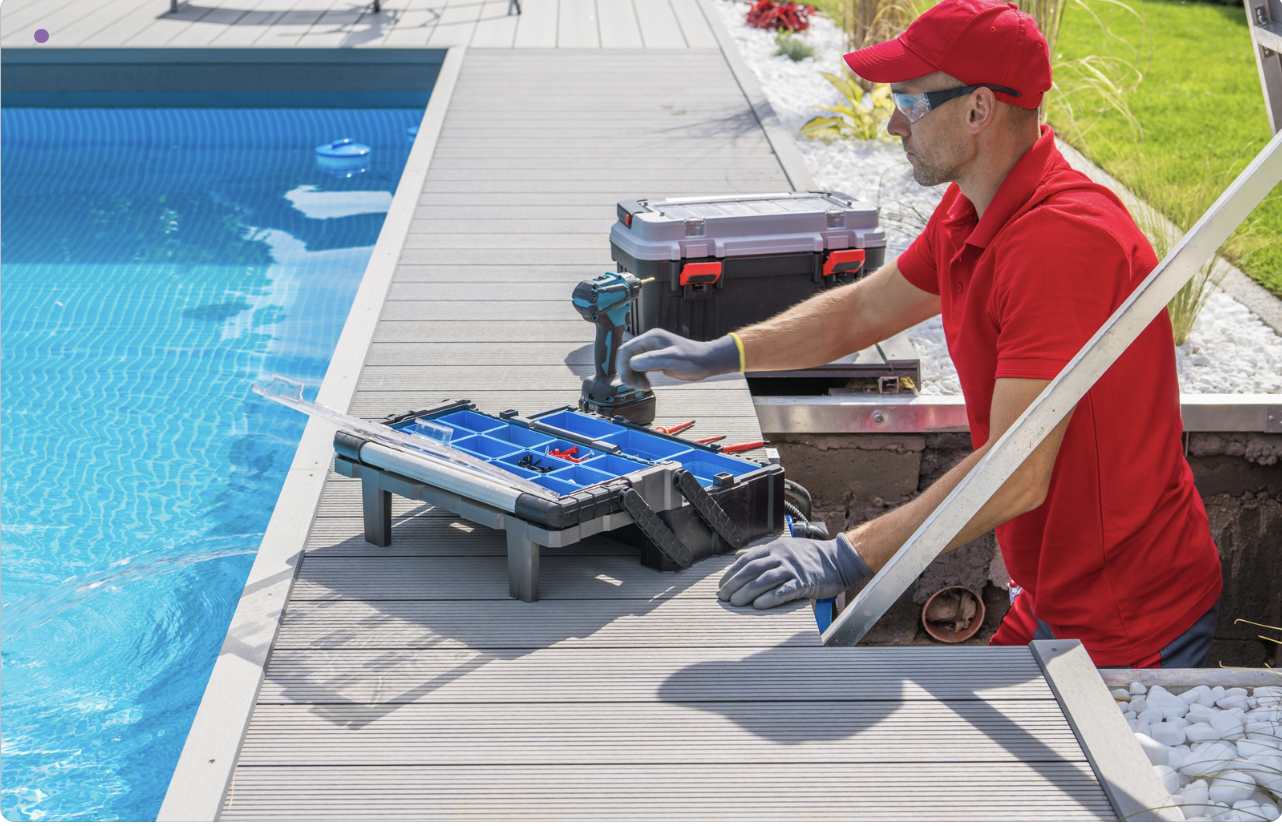
A backyard pool offers relaxation, fun, and a refreshing escape from the summer heat. However, keeping pool areas safe requires more than just clean water and clear visibility; proper electrical setup and maintenance are critical to ensuring that your pool remains a safe environment for everyone. From pool lighting installation to regular maintenance, a qualified pool electrician can help you create a secure and enjoyable swimming experience. This guide explores essential pool electrical services, safety tips, and how a pool electrician can contribute to a safe, well-lit pool environment.
The Importance of Pool Electrician Services
Reducing Electrical Hazards in Pool Areas
Water and electricity are a dangerous combination, and when pool electrical systems aren’t properly installed or maintained, they can pose serious risks, including electric shock. Hiring a licensed pool electrician ensures that all electrical work around the pool is performed safely and meets local and national safety codes, reducing the risk of accidents.
Enhancing Pool Aesthetics and Functionality
Pool lighting installation doesn’t just improve safety—it also enhances the pool’s aesthetic appeal and usability. A skilled pool electrician can install various lighting solutions, including underwater lights, landscape lighting, and accent lighting, allowing you to enjoy your pool area well into the evening with ambiance and security.
Compliance with Electrical Codes
Pool electrical installations are subject to strict codes due to the potential hazards associated with water and electricity. A pool electrician ensures compliance with these codes, protecting your family and property from potential fines or liability issues. Adhering to electrical regulations also contributes to the resale value of your home by ensuring a safe and compliant pool setup.
Essential Pool Electrician Services
Pool Lighting Installation
Proper lighting around and within the pool area is crucial for safety, especially at night. Pool lighting installation involves selecting and positioning lights in a way that illuminates the pool and surrounding areas effectively. Underwater lights, deck lights, and landscape lighting can all be integrated to enhance both safety and the aesthetic appeal of the pool area.
- Underwater Lighting: Installed directly within the pool, underwater lights provide visibility for swimmers and add a unique ambiance. These lights are specifically designed to be waterproof and protected from chemical exposure.
- Deck and Pathway Lighting: Lighting pathways and decks around the pool area minimizes tripping hazards and ensures safe access to the pool.
- Accent Lighting: Accent lights placed on landscaping or seating areas enhance the atmosphere around the pool, creating a welcoming environment for evening gatherings.
Pool Pump and Heater Wiring
A pool’s pump and heater require specialized wiring to handle high electrical loads safely. A pool electrician will wire these components properly to ensure they operate efficiently and without risk of overheating. Proper wiring for pumps and heaters is essential to avoid frequent tripping of breakers or electrical overloads, keeping the pool’s filtration and heating systems running smoothly.
Installation of Ground Fault Circuit Interrupters (GFCIs)
GFCI outlets and breakers are essential safety devices for any pool area, as they automatically shut off power if a ground fault is detected, preventing electrical shock. A pool electrician can install GFCIs near the pool and on all outlets used to power equipment and lighting. Regular testing of GFCIs is recommended to ensure they’re functioning correctly, and a pool electrician can handle repairs or replacements if needed.
Bonding and Grounding of Pool Equipment
Bonding and grounding are crucial for pool electrical safety, as they prevent electrical currents from posing a risk to swimmers. Bonding connects all metallic components, such as ladders, pumps, and lights, creating a unified electrical system. Grounding ensures that excess electrical current is safely directed into the earth. A licensed pool electrician will ensure proper bonding and grounding to reduce the risk of electric shock.
Regular Maintenance and Inspections
Regular maintenance of pool electrical systems helps catch potential issues before they become hazards. A pool electrician can conduct periodic inspections to ensure that all wiring, breakers, and lighting are in good condition. This includes checking for wear and tear on wiring, testing GFCIs, and cleaning fixtures. Routine maintenance provides peace of mind that your pool’s electrical system is safe and operational.
Pool Lighting Options for Safety and Aesthetics
LED Pool Lights
LED lights are a popular choice for pool lighting due to their energy efficiency, long lifespan, and bright illumination. Available in various colors and styles, LED pool lights enhance safety by illuminating the pool clearly, and they can add a unique visual appeal with color-changing options. LED lights are also low-maintenance and generate minimal heat, making them ideal for continuous underwater use.
Fiber Optic Lights
Fiber optic lights offer a visually striking lighting option that can be used to create soft, colorful lighting effects around the pool. The light source is placed outside the pool, with fiber optic cables transmitting the light into the water. This setup makes fiber optic lights easy to replace without entering the pool and reduces the risk of electric shock. Although less common than LEDs, fiber optics are a safe and customizable choice for pool lighting installation.
Solar Pool Lights
Solar lights use renewable energy, making them an eco-friendly choice for pool lighting. While they don’t offer the same brightness as traditional options, solar lights can provide ambient lighting around the pool and are easy to install since they don’t require wiring. They are a cost-effective choice for homeowners who want supplemental lighting and minimal energy costs.
Key Safety Tips for Pool Electrical Systems
Schedule Regular Inspections
Periodic inspections by a licensed pool electrician are essential to keep your pool’s electrical system safe and efficient. Inspections should include checking the integrity of wiring, testing GFCIs, and verifying that lights are functioning properly. Inspections help identify issues early, allowing for quick repairs that prevent potential hazards.
Test GFCIs Monthly
GFCIs are crucial for preventing electric shock, especially around pools. Test GFCI outlets monthly by pressing the “test” button. If the power doesn’t shut off, it’s time to call a pool electrician to inspect or replace the GFCI. Functional GFCIs are essential for safe pool operations, particularly in wet environments.
Keep Electrical Devices Away from the Pool
Avoid placing electrical devices, such as radios, speakers, or extension cords, near the pool area. Water increases the risk of electric shock when in contact with these devices, so it’s best to keep them at a safe distance. If you need outdoor entertainment, consult a pool electrician about installing weatherproof outlets or integrated speakers designed for pool environments.
Avoid DIY Repairs
Attempting to fix pool electrical issues yourself can be risky, as it requires specific knowledge of pool wiring and electrical codes. Incorrect repairs increase the risk of shock or fire hazards. Always rely on a professional pool electrician to handle repairs and installations to ensure compliance with safety regulations and standards.
Benefits of Professional Pool Electrician Services
Improved Safety and Compliance
A professional pool electrician ensures that all electrical work is up to code and safe for operation. From GFCI installation to bonding and grounding, pool electricians handle the intricate details that ensure your pool area remains safe. Their expertise also helps prevent costly mistakes and improves the long-term reliability of your pool’s electrical system.
Enhanced Energy Efficiency
A pool electrician can help you choose energy-efficient lighting and equipment, such as LED lights and efficient pumps. These upgrades reduce energy consumption, resulting in lower utility bills and a more environmentally friendly pool. Energy-efficient installations also minimize heat generation, which contributes to the longevity of pool lighting fixtures and equipment.
Increased Property Value
Well-maintained pools and safe electrical setups enhance property value, especially as buyers increasingly look for energy-efficient and safe amenities. A professional pool electrician’s work can help increase your property’s appeal, demonstrating your commitment to safety and quality in your home’s outdoor spaces.
Signs It’s Time to Call a Pool Electrician
Frequent Breaker Trips
If the circuit breaker for your pool equipment frequently trips, it could indicate an overloaded or faulty circuit. A pool electrician can diagnose the problem, determine if the breaker size is appropriate, and replace any worn-out components.
Flickering or Dimming Pool Lights
Flickering or dimming pool lights are signs of electrical issues, such as loose wiring or corroded connections. A pool electrician will identify the cause and repair or replace any problematic wiring to restore stable lighting.
Hot Outlets or Switches
If you notice any heat around outlets or switches near the pool, this could indicate an electrical problem that requires immediate attention. A pool electrician can assess the issue and take corrective action to prevent potential fire hazards.
Unresponsive Pool Equipment
If your pool pump, heater, or lighting fails to operate, it may be due to an electrical issue. A licensed pool electrician can troubleshoot the problem, repair faulty wiring, and restore the equipment’s functionality, ensuring your pool remains operational.
Conclusion: Trust a Pool Electrician for a Safe and Enjoyable Pool Experience
Hiring a pool electrician for your pool lighting installation, equipment wiring, and routine maintenance is essential for maintaining a safe, well-functioning pool area. From installing GFCIs to designing energy-efficient lighting layouts, a qualified pool electrician ensures that every component is set up safely and meets local codes. By investing in professional pool electrician services, you protect your family and guests while enhancing the beauty and functionality of your pool area, allowing you to enjoy a safe summer swim season.
FAQs
Why is a pool electrician necessary for pool lighting installation?
Pool electricians specialize in safely installing pool lighting and electrical systems, ensuring compliance with codes and minimizing the risk of electric shock around water.
How often should GFCIs around the pool be tested?
GFCIs should be tested monthly by pressing the “test” button. If they don’t trip, contact a pool electrician for an inspection to ensure safe operation.
Can I use extension cords near my pool?
No, extension cords are unsafe near water as they increase the risk of electric shock. Consult a pool electrician about installing weatherproof outlets if needed.
What type of lighting is best for pools?
LED lights are the most energy-efficient and durable option for pool lighting, offering bright illumination with minimal heat production and a long lifespan.
What is the importance of bonding and grounding in pool areas?
Bonding and grounding prevent electric shocks by ensuring that all metal components around the pool are connected to a unified electrical system, directing stray currents safely into the ground.







